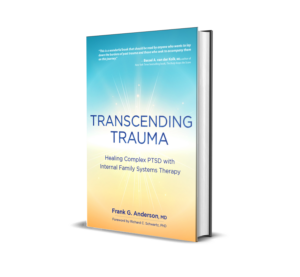Podcast: Play in new window | Download (Duration: 1:08:28 — 156.7MB)
Subscribe: Apple Podcasts | Spotify | Amazon Music
There is an entire world within each of us. While we come together to create one functioning human being – what is really happening internally to make it all work?
Our entire existence is made of different systems – all collaborating to keep us operating healthily on a mental, emotional, and physical level. But what happens when the systems don't operate smoothly? Just like any system, there can be conflicts that can make the process significantly more difficult. These “parts” are entities or “little beings” that live in our minds and manifest into physical or emotional reactions from traumatic events. Dr. Frank Anderson has spent decades of his life studying these parts and sharing his findings to help others utilize built-in resources like their “self-energy” to navigate their own traumas. Follow along as Sue Marriott and Dr. Anderson weave together psycho-pharmacology, trauma, neuroscience, attachment, and internal family systems.
“Imagination is a very powerful neuroplastic agent. So the work that we do in IFS – which is very much imaginary – absolutely has neurophysiological effects on neural networks on the brain and on the body. It's a beautiful intersection between psychotherapy and neuroscience, and we have more evidence to show the ways they're linked together.” – Dr. Frank Anderson
Ep 182 – About Frank Anderson and IFS
 Dr. Frank Anderson is an author, psychiatrist, therapist, speaker and trauma specialist who’s spent the past three decades studying neuroscience and trauma treatment. He was a psychiatrist as the Trauma Center in Boston under the direction of Bessel van der Kolk, and was able to learn more about trauma while simultaneously continuing his quest of helping others heal. After meeting Dick Schwartz at a conference his career focus instantly came into full alignment, and he was able to integrate his knowledge of neuroscience and trauma treatment with Internal Family Systems (IFS) therapy. Anderson was the former chair and executive director of the Foundation for Self Leadership, an organization focusing on IFS research and the expansion of the IFS model beyond psychotherapy and authored the chapter “Who’s Taking What? Connecting Neuroscience, Psychopharmacology, and Internal Family Systems for Trauma.” He is the lead trainer and consultant for the IFS Institute, an advisor to the International Association of Trauma Professionals (IATP), and maintains a private practice. He is passionate about teaching, enjoy providing therapy consultations and trauma informed IFS-related workshops throughout the world.
Dr. Frank Anderson is an author, psychiatrist, therapist, speaker and trauma specialist who’s spent the past three decades studying neuroscience and trauma treatment. He was a psychiatrist as the Trauma Center in Boston under the direction of Bessel van der Kolk, and was able to learn more about trauma while simultaneously continuing his quest of helping others heal. After meeting Dick Schwartz at a conference his career focus instantly came into full alignment, and he was able to integrate his knowledge of neuroscience and trauma treatment with Internal Family Systems (IFS) therapy. Anderson was the former chair and executive director of the Foundation for Self Leadership, an organization focusing on IFS research and the expansion of the IFS model beyond psychotherapy and authored the chapter “Who’s Taking What? Connecting Neuroscience, Psychopharmacology, and Internal Family Systems for Trauma.” He is the lead trainer and consultant for the IFS Institute, an advisor to the International Association of Trauma Professionals (IATP), and maintains a private practice. He is passionate about teaching, enjoy providing therapy consultations and trauma informed IFS-related workshops throughout the world.
Time Stamps for Ep 182
4:12 – Frank's explanation of IFS
8:07 – Introduction to the concept of “self-energy”
17:27 – The neurobiology of PTSD & disassociation
30:31 – Frank's unconventional views on attachment
41:46 – Key components of IFS that are essential for healing
46:25 – The IFS training process
51:57 – Finding an IFS certified therapist
Resources for Ep 182
IFS Group Consultation Course – Training
Webinars on Various Topics – Training
The Arc of Healing Trauma – Online Course
“Internal Family Systems: Skills Training Manual” – Book
Relevant Therapist Uncensored Episodes
TU112: The Life-Changing Science of Memory Reconsolidation with Guests Bruce Ecker & Tori Olds
















